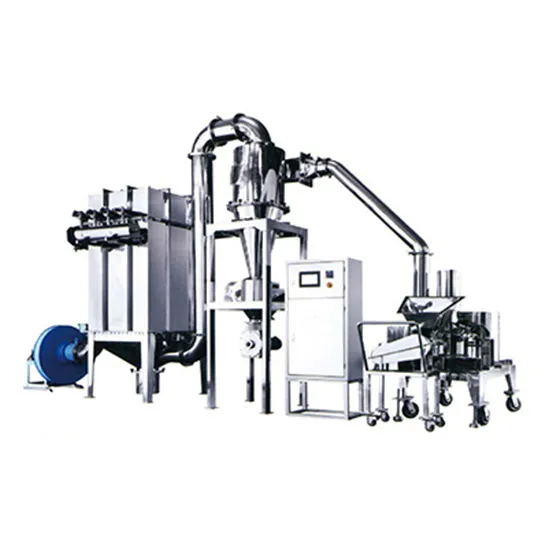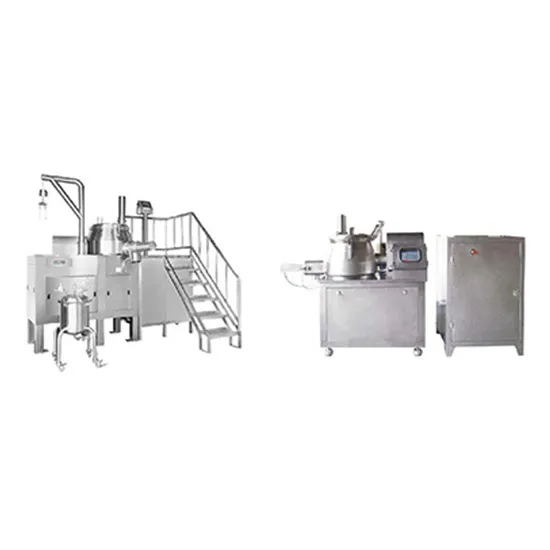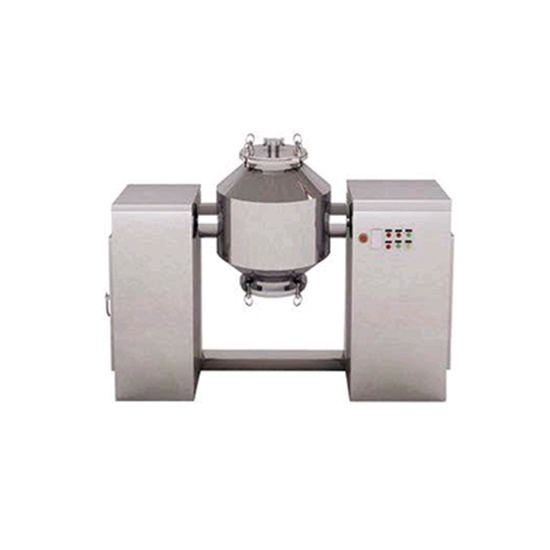NEWS
Granulator for Pharmaceutical Granulation: Ensuring Drug Stability
Oct 04,2023
Table of Contents:
1. Introduction
2. Importance of Pharmaceutical Granulation
3. Understanding Granulators
4. Types of Granulators in Pharmaceutical Manufacturing
5. Factors to Consider When Choosing a Granulator
6. Key Features of an Effective Granulator
7. Ensuring Drug Stability through Granulation
8. Common Challenges in Pharmaceutical Granulation
9. FAQs (Frequently Asked Questions)
10. Conclusion
1. Introduction
In the complex world of pharmaceutical manufacturing, drug stability is of utmost importance to ensure the safety and efficacy of medications. Granulators play a crucial role in the process of pharmaceutical granulation, which involves the formation of granules to improve drug stability and enhance processing efficiency. This article dives into the significance of granulators in pharmaceutical granulation and provides valuable insights on how to select the right granulator for your manufacturing needs.
2. Importance of Pharmaceutical Granulation
Pharmaceutical granulation involves the agglomeration of fine powder particles to form granules, which are easier to handle, transport, and process. Granulation enhances drug stability by reducing chemical degradation, improving flow properties, and ensuring uniform drug distribution. It also promotes content uniformity, reduces dust formation, and facilitates tablet compression or capsule filling. By increasing the drug's surface area, granulation enhances dissolution, leading to faster and more predictable drug absorption.
3. Understanding Granulators
Granulators are specialized machines used in pharmaceutical manufacturing to facilitate the granulation process. These machines break down dry powders or wet mass into smaller particles and then bind them together to form granules. Granulators are available in various designs and configurations, each suited for specific granulation techniques.
4. Types of Granulators in Pharmaceutical Manufacturing
a. High Shear Granulators: These granulators utilize mechanical forces and shear to create granules. They consist of a rotor and a stator, which generate intense mixing and kneading action to form granules.
b. Fluid Bed Granulators: These granulators use a combination of fluidization and spraying techniques to create granules. The powders are fluidized by a stream of air, and a binder solution is sprayed onto the particles, causing them to adhere and form granules.
c. Roll Compactors: This type of granulator employs a compression force to compact the powders into flakes, which are then milled and sieved to obtain granules.
d. Extruders and Spheronizers: Extruders extrude the wet mass through a screen, producing cylindrical extrudates. These extrudates are then spheronized to obtain spherical granules.
5. Factors to Consider When Choosing a Granulator
Choosing the right granulator for pharmaceutical granulation requires careful consideration of several factors:
- Processing Capacity: Determine the required granulation capacity to ensure the granulator can handle the desired quantity of materials efficiently.
- Granulation Technique: Select a granulator that aligns with the specific granulation technique preferred for your pharmaceutical products.
- Particle Size Distribution: Consider the desired particle size range and the granulator's capability to achieve it.
- Equipment Size and Footprint: Assess the available space in your facility and choose a granulator that fits without hindering other manufacturing processes.
- Ease of Cleaning and Maintenance: Opt for a granulator that is easy to clean and maintain to ensure productivity and prevent cross-contamination.
6. Key Features of an Effective Granulator
a. Uniform Mixing: A good granulator should provide uniform mixing of powders or wet mass to ensure consistent granule quality.
b. Controlled Granule Size: The granulator should offer precise control over the size and distribution of the granules produced.
c. Efficient Binder Incorporation: The granulator must effectively incorporate binders, ensuring optimal binder distribution for granule formation.
d. Easy Scale-up: If scalability is a requirement, choose a granulator that allows for easy scale-up without compromising granulation quality.
e. Process Validation Support: Look for a granulator manufacturer that provides comprehensive process validation support to comply with regulatory requirements.
7. Ensuring Drug Stability through Granulation
Granulation plays a vital role in ensuring drug stability by protecting the active pharmaceutical ingredient (API) from degradation caused by factors such as moisture, temperature, and light. The granulation process creates a protective barrier around the API, shielding it from external influences and extending its shelf life. Additionally, granules provide a more uniform drug distribution, reducing the risk of content variability and ensuring consistent drug potency.
8. Common Challenges in Pharmaceutical Granulation
a. Dust Formation: Granulation can generate dust, which poses safety hazards for operators and affects product quality. Proper containment systems and dust control measures are essential to mitigate these risks.
b. Moisture Sensitivity: Some APIs are sensitive to moisture, and excessive moisture content in granules can lead to drug degradation. Granulators equipped with efficient drying capabilities help address this challenge.
c. API Compatibility: Compatibility issues between APIs and excipients can affect granulation outcomes. It is crucial to choose granulation techniques and excipients that maintain API stability.
d. Uniformity Issues: Inadequate mixing or granule formation can result in content uniformity problems. Granulators with superior mixing capabilities contribute to better uniformity.
9. FAQs (Frequently Asked Questions)
FAQ 1: How does granulation improve drug stability?
FAQ 2: What are the critical factors to consider when selecting a granulator?
FAQ 3: Is it possible to granulate both wet and dry powders?
FAQ 4: How can I prevent dust formation during the granulation process?
FAQ 5: Can granulation help improve tablet compression or capsule filling?
10. Conclusion
Granulators play a pivotal role in pharmaceutical granulation, ensuring drug stability and consistent product quality. By choosing the right granulator and employing appropriate granulation techniques, pharmaceutical manufacturers can achieve improved drug performance, enhanced shelf life, and increased patient safety. Understanding the factors influencing granulator selection and addressing common challenges in granulation are essential steps towards successful pharmaceutical manufacturing.
1. Introduction
2. Importance of Pharmaceutical Granulation
3. Understanding Granulators
4. Types of Granulators in Pharmaceutical Manufacturing
5. Factors to Consider When Choosing a Granulator
6. Key Features of an Effective Granulator
7. Ensuring Drug Stability through Granulation
8. Common Challenges in Pharmaceutical Granulation
9. FAQs (Frequently Asked Questions)
10. Conclusion
1. Introduction
In the complex world of pharmaceutical manufacturing, drug stability is of utmost importance to ensure the safety and efficacy of medications. Granulators play a crucial role in the process of pharmaceutical granulation, which involves the formation of granules to improve drug stability and enhance processing efficiency. This article dives into the significance of granulators in pharmaceutical granulation and provides valuable insights on how to select the right granulator for your manufacturing needs.
2. Importance of Pharmaceutical Granulation
Pharmaceutical granulation involves the agglomeration of fine powder particles to form granules, which are easier to handle, transport, and process. Granulation enhances drug stability by reducing chemical degradation, improving flow properties, and ensuring uniform drug distribution. It also promotes content uniformity, reduces dust formation, and facilitates tablet compression or capsule filling. By increasing the drug's surface area, granulation enhances dissolution, leading to faster and more predictable drug absorption.
3. Understanding Granulators
Granulators are specialized machines used in pharmaceutical manufacturing to facilitate the granulation process. These machines break down dry powders or wet mass into smaller particles and then bind them together to form granules. Granulators are available in various designs and configurations, each suited for specific granulation techniques.
4. Types of Granulators in Pharmaceutical Manufacturing
a. High Shear Granulators: These granulators utilize mechanical forces and shear to create granules. They consist of a rotor and a stator, which generate intense mixing and kneading action to form granules.
b. Fluid Bed Granulators: These granulators use a combination of fluidization and spraying techniques to create granules. The powders are fluidized by a stream of air, and a binder solution is sprayed onto the particles, causing them to adhere and form granules.
c. Roll Compactors: This type of granulator employs a compression force to compact the powders into flakes, which are then milled and sieved to obtain granules.
d. Extruders and Spheronizers: Extruders extrude the wet mass through a screen, producing cylindrical extrudates. These extrudates are then spheronized to obtain spherical granules.
5. Factors to Consider When Choosing a Granulator
Choosing the right granulator for pharmaceutical granulation requires careful consideration of several factors:
- Processing Capacity: Determine the required granulation capacity to ensure the granulator can handle the desired quantity of materials efficiently.
- Granulation Technique: Select a granulator that aligns with the specific granulation technique preferred for your pharmaceutical products.
- Particle Size Distribution: Consider the desired particle size range and the granulator's capability to achieve it.
- Equipment Size and Footprint: Assess the available space in your facility and choose a granulator that fits without hindering other manufacturing processes.
- Ease of Cleaning and Maintenance: Opt for a granulator that is easy to clean and maintain to ensure productivity and prevent cross-contamination.
6. Key Features of an Effective Granulator
a. Uniform Mixing: A good granulator should provide uniform mixing of powders or wet mass to ensure consistent granule quality.
b. Controlled Granule Size: The granulator should offer precise control over the size and distribution of the granules produced.
c. Efficient Binder Incorporation: The granulator must effectively incorporate binders, ensuring optimal binder distribution for granule formation.
d. Easy Scale-up: If scalability is a requirement, choose a granulator that allows for easy scale-up without compromising granulation quality.
e. Process Validation Support: Look for a granulator manufacturer that provides comprehensive process validation support to comply with regulatory requirements.
7. Ensuring Drug Stability through Granulation
Granulation plays a vital role in ensuring drug stability by protecting the active pharmaceutical ingredient (API) from degradation caused by factors such as moisture, temperature, and light. The granulation process creates a protective barrier around the API, shielding it from external influences and extending its shelf life. Additionally, granules provide a more uniform drug distribution, reducing the risk of content variability and ensuring consistent drug potency.
8. Common Challenges in Pharmaceutical Granulation
a. Dust Formation: Granulation can generate dust, which poses safety hazards for operators and affects product quality. Proper containment systems and dust control measures are essential to mitigate these risks.
b. Moisture Sensitivity: Some APIs are sensitive to moisture, and excessive moisture content in granules can lead to drug degradation. Granulators equipped with efficient drying capabilities help address this challenge.
c. API Compatibility: Compatibility issues between APIs and excipients can affect granulation outcomes. It is crucial to choose granulation techniques and excipients that maintain API stability.
d. Uniformity Issues: Inadequate mixing or granule formation can result in content uniformity problems. Granulators with superior mixing capabilities contribute to better uniformity.
9. FAQs (Frequently Asked Questions)
FAQ 1: How does granulation improve drug stability?
FAQ 2: What are the critical factors to consider when selecting a granulator?
FAQ 3: Is it possible to granulate both wet and dry powders?
FAQ 4: How can I prevent dust formation during the granulation process?
FAQ 5: Can granulation help improve tablet compression or capsule filling?
10. Conclusion
Granulators play a pivotal role in pharmaceutical granulation, ensuring drug stability and consistent product quality. By choosing the right granulator and employing appropriate granulation techniques, pharmaceutical manufacturers can achieve improved drug performance, enhanced shelf life, and increased patient safety. Understanding the factors influencing granulator selection and addressing common challenges in granulation are essential steps towards successful pharmaceutical manufacturing.
More News










